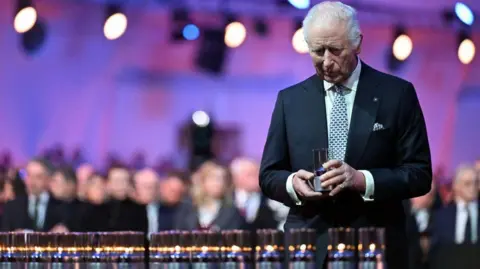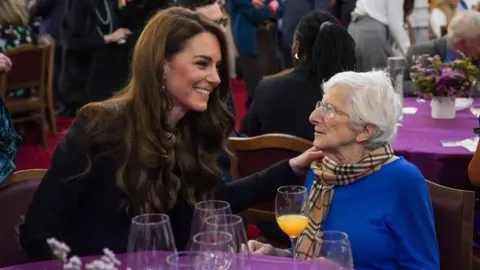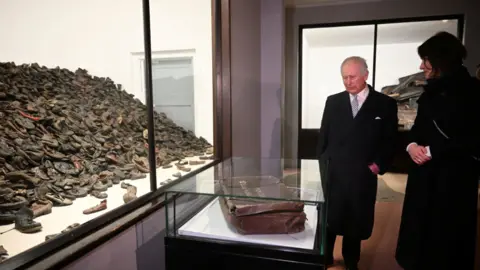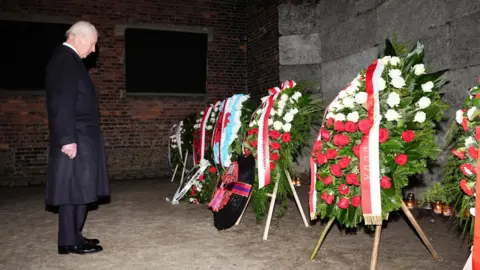Remembering past evil is vital, King says as he visits Auschwitz
 Getty Images
Getty ImagesKing Charles III said "the act of remembering the evils of the past remains a vital task" as he met Holocaust survivors in Poland.
He spoke at a Jewish community centre in Krakow ahead of becoming the first British head of state to visit Auschwitz, where he attended a commemoration event to mark the 80 years since its liberation.
Meanwhile, the Prince and Princess of Wales met survivors at a Holocaust Memorial Day ceremony in London, where William paid tribute to their "bravery".
Prime Minister Sir Keir Starmer also attended the London event.
Prince William thanked those present for their "bravery in sharing with us the most harrowing moments of their lives".
"We remember the survivors who live with the scars, both mental and physical," he said.
Survivors who took part included Rachel Levy, who survived Auschwitz as a 13-year-old, Steven Frank and Yvonne Bernstein.
Asked about his continued efforts to share his experiences, Mr Frank said he did so "because I've had so much good fortune coming to this country and having lived, loved, played sport, had a nice family, and it's time to give something back".
Speaking about a recent trip to Auschwitz, Sir Keir said "it showed more powerfully than ever how the Holocaust was a collective endeavour by thousands of ordinary individuals utterly consumed by the hatred of difference".
 PA Media
PA MediaHe added: "That is the hatred we stand against today and it is a collective endeavour for all of us to defeat it."
People around the UK were asked to light a candle in their windows to remember those who were killed and to stand against prejudice and hatred.
Landmarks, buildings and monuments were lit up in purple as part of the Light the Darkness national moment, including, the London Eye and the Liver Building in Liverpool. A candle was also being lit at No 10.
Holocaust Memorial Day, which takes place on 27 January each year, remembers the six million Jews murdered during World War Two.
It also commemorates the millions of people outside the Jewish faith who were murdered through Nazi persecution, and those targeted in more recent genocides.
- Follow live: 80 years since liberation of Auschwitz-Birkenau
- The difficult question about Auschwitz that remains unanswered
- Russia focuses on Soviet victims of WW2 as officials not invited to ceremony
- How death camp became centre of Nazi Holocaust
Auschwitz-Birkenau was the largest Nazi concentration camp and was at the centre of the Nazi campaign to eradicate Europe's Jewish population.
 Reuters
Reuters Reuters
ReutersThe King has long wanted to be present at Auschwitz for the liberation ceremony - not just because of the significance of the milestone but also to bear witness to the testimony of survivors in the location where so much suffering happened.
On Monday, he gave a speech at the Jewish Community Centre in Krakow where he met Holocaust survivors.
In it, he said "as the number of Holocaust survivors regrettably diminishes with the passage of time, the responsibility of remembrance rests on our shoulders".
In Krakow, "from the ashes of the Holocaust, the Jewish community has been reborn," the King added.
Sources close to the King say this is a profound visit for him, with one aide describing it as a "deeply personal pilgrimage."
In 1943, the King's grandmother, Princess Alice of Greece, saved a Jewish family by taking them into her home and hiding them in Nazi-occupied Athens - something the King has said brought him and the Royal Family an immense sense of pride.
During his brief visit to Poland the King will also meet President Andrzej Duda.
On Wednesday, Sir Keir welcomed a group of survivors and their families to Downing Street, describing the meeting as "an incredible privilege" and praised their "sheer and remarkable courage".
Mala Tribich, a survivor of the Holocaust who settled in England in 1947, also spoke to BBC Radio 4's Today programme. She spoke about her forced separation from her family, and her subsequent detention in the Ravensbrück and Bergen-Belsen concentration camps.
Jewish people were treated like "cattle" by the Nazis, Ms Tribich said, explaining how she felt the de-humanising treatment they were subjected to "did something to our soul".
The 94-year-old also stressed the importance of ensuring "young people get the right education" to avoid a repeat of the horrors she had experienced as a girl. "We're all hoping for a better world, but we need to contribute to it," she said.
Tory leader Kemi Badenoch spoke of the importance of confronting "the resurgence of antisemitism today", while reflecting on the Holocaust as a "unique evil in human history", in a statement to mark Holocaust Memorial Day.
While Liberal Democrat leader Sir Ed Davey urged vigilance in defending "peace, human rights and compassion", and guarding against "antisemitism, hatred, discrimination and oppression".
Additional reporting by Lucy Clarke-Billings
